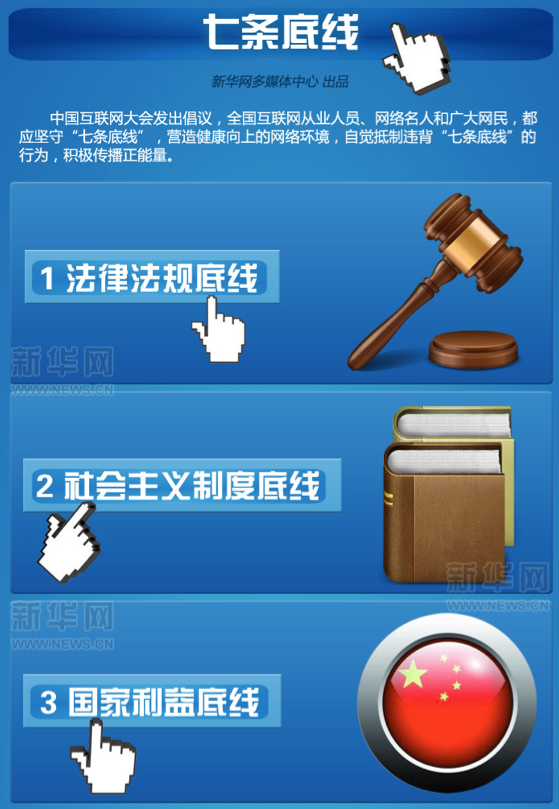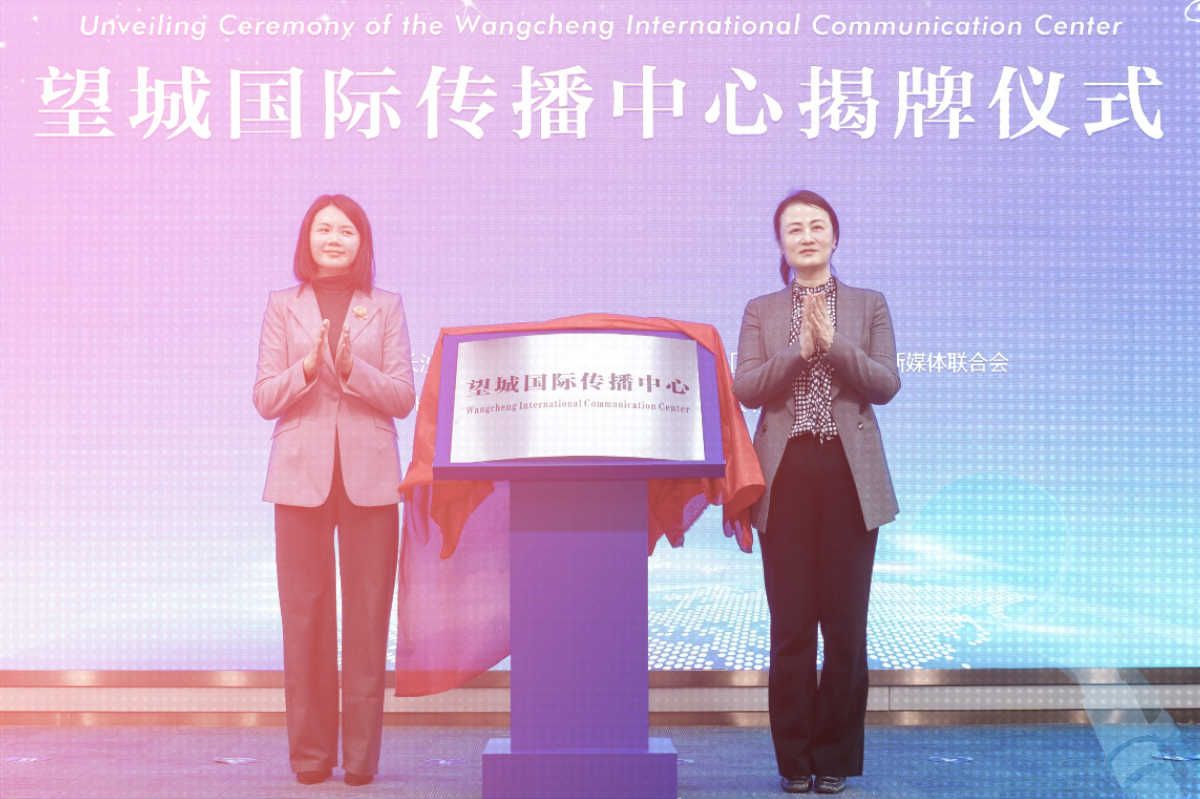The recent “China Internet Conference“, held in Beijing from August 13-15, agreed on what it called a “resolution” on the “mutual building of a favorable [online] environment.” The spirit of that resolution is encapsulated in what is now being called the “Seven Base Lines“, or qi tiao dixian (七条底线).
The “Seven Base Lines” are meant to provide all internet users, but particularly internet industry participants and online personalities (网络名人), with a set of guidelines for what constitutes acceptable online conduct and leads to a “healthy online environment.”
Run down the list of the “Seven Base Lines” and it is painfully obvious that this is part of a new government initiative to assert stronger control over online speech. What we are witnessing is yet another internet tightening in China ostensibly carried out to combat online “rumors.” [For my thoughts on the last major anti-rumor campaign two years ago, see my piece, “Rumor Fever.”
You might assume with all this talk of “rumors” that there are genuine concerns about the truth and accuracy of information. Perhaps the leadership wants to put a stop to the spread of false and destabilizing information — like talk of radiation fallout that prompts panic salt buying (one thing mentioned a lot during the 2011 anti-rumor crackdown).
You would be wrong.
Let’s look quickly as the “Seven Base Lines.”
1. The Base Line of Laws and Regulations
2. The Base Line of the Socialist System
3. The Base Line of National Interests
4. The Base Line of Citizens’ Legal Rights and Interests
5. The Base Line of Public Order
6. The Moral Base Line
7. The Base Line of Information Accuracy
Notice that information accuracy is at the bottom of the list. The most revealing are 2 and 3 above, which clearly define the political priorities of the leadership. Information cannot violate the “socialist system,” and it must abide by a generalized notion of upholding China’s national interests. Both of these are huge potential pitfalls.

No doubt we’ll keep any eye on these “Seven Base Lines.” But for now let’s turn to a commentary in today’s Nanfang Daily, the official Party paper of Guangdong province, which sums up the official view on this issue quite well.
“Resisting Online Rumors is the Responsibility of Every Citizen“
Nanfang Daily
August 27, 2013
The Public Security Bureau has recently launched a strike against organised fabrication and transmission of rumor and other crimes. A number of online personalities, including “Qin Huo Huo” (秦火火), “Li Er Chai Si” (立二拆四), Zhou Lubao (周禄宝) and Fu Xuesheng (傅学胜) have fallen into the net one after another for such activities as fabricating and spreading rumors, extortion and racketeering. These cases caution us once again that online society is not a lawless and unruly place, and that anyone who violates the law online will pay the legal price.
While the internet provides people with a convenient, fast and diverse experience, it has also become an important place for the spreading of rumors and the breeding of false information. While online society is a virtual space, it has a certain quality of the real, serving as a public space for an unspecified group of people, and to a large extent it has a direct impact on real society. After the emergence of Weibo and WeChat, the transmission of information happens much faster, people obtain information much more quickly, and it become much more difficult at the same time to spot rumors. This means that the harm and damage done by rumors is also substantially increased.
. . .
Online rumors are everywhere, and everyone can potentially become an unknowing pusher, and also an unknowing victim. This means not only that we must pursue the legal responsibility of those who fabricate rumors, but also requires civic consciousness on the part of every web users, so that we can protect the cleanliness of the online environment. In this age of sophisticated online information technologies, as we face mass amounts of information in a virtual world where transmission happens fast, many people don’t pay attention to whether information is accurate or not when it breaks — they care, rather, about whether it is sensational, whether or not it can attract people’s attention. And then they just blindly pass it on. This provides the soil in which rumors can spread. At the same time, because of the spread of these rumors, the rights and interests of certain people can be harmed, resulting in real damage. Rumors of a pest infestation striking tangerines resulted in serious drops in sales all over the country. Rumours of the “suspect” death of a young woman at a Beijing shopping mall resulted in a mass incident. These are all cases with important lessons. Rumors about nuclear radiation resulting in the hoarding of salt, and rumours about “leather milk” once again damaging the domestic dairy industry are further examples of the social harm done by rumors.
Clearing up the online environment to a large extent requires self-discipline and self-censorship on the part of web users, the raising of one’s own media literacy in the internet age, so that rumour can be avoided and positive energy (正能量) spread. We must make our own judgements about the truth of certain information, raising our good sense and our sense of responsibility, acting on the principle of “not spreading rumors and not believing rumors” (不传谣、不信谣). When we come across information of dubious origin, we must take this into consideration and seek to confirm it, not just jump on the bandwagon and spread it along. We must avoid becoming an opportunity that rumourmongers can exploit. We must not give rumours the opportunity to spread. Recently, the State Internet Information Office held a “Responsibility Forum for Online Personalities” (网络名人社会责任论坛) which reached a consensus about bearing social responsibility, about transmitting positive energy, and which held up “Seven Base Lines” [for online conduct]. These raise clear guidelines for online personalities to responsibly abide by the law. There is no such thing as unrestricted freedom, and this is especially important for online personalities.
As the internet grows daily more connection to economic and social life, the web is no longer just a virtual space — rather, it is a part of the real world, and extension of real life. Every person who is active on the internet corresponds to a real person in actual life. Therefore, we must ensure that social public opinion supervision, of which the checking of online rumors is a part, is brought into the orbit of the law, creating a normalised supervision system in which those responsible for fabricating online rumors and those who transmit them are held responsible under the law. Of course, from a legal perspective, eliminating online rumors first requires delimiting what exactly constitutes a rumor, and raises the question of who should make this determination; next, our laws must be improved, so that laws, regulations and penal provisions relevant to information on the internet are all in accord, the system of legal responsibility is improved, and the creation and spread of online rumors can be checked.





















